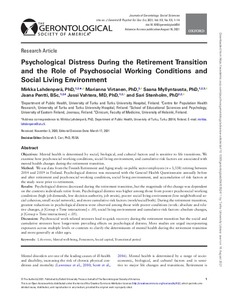| dc.contributor.author | Lahdenperä Mirkka | |
| dc.contributor.author | Stenholm Sari | |
| dc.contributor.author | Vahtera Jussi | |
| dc.contributor.author | Virtanen Marianna | |
| dc.contributor.author | Pentti Jaana | |
| dc.contributor.author | Myllyntausta Saana | |
| dc.date.accessioned | 2022-10-27T12:12:42Z | |
| dc.date.available | 2022-10-27T12:12:42Z | |
| dc.identifier.uri | https://www.utupub.fi/handle/10024/157043 | |
| dc.description.abstract | <p>Mental health is determined by social, biological, and cultural factors and is sensitive to life transitions. We examine how psychosocial working conditions, social living environment, and cumulative risk factors are associated with mental health changes during the retirement transition.\nWe use data from the Finnish Retirement and Aging study on public sector employees (n = 3,338) retiring between 2014 and 2019 in Finland. Psychological distress was measured with the General Health Questionnaire annually before and after retirement and psychosocial working conditions, social living environment, and accumulation of risk factors at the study wave prior to retirement.\nPsychological distress decreased during the retirement transition, but the magnitude of the change was dependent on the contexts individuals retire from. Psychological distress was higher among those from poorer psychosocial working conditions (high job demands, low decision authority, job strain), poorer social living environment (low neighborhood social cohesion, small social network), and more cumulative risk factors (work/social/both). During the retirement transition, greatest reductions in psychological distress were observed among those with poorer conditions (work: absolute and relative changes, p [Group × Time interactions] < .05; social living environment and cumulative risk factors: absolute changes, p [Group × Time interactions] < .05).\nPsychosocial work-related stressors lead to quick recovery during the retirement transition but the social and cumulative stressors have longer-term prevailing effects on psychological distress. More studies are urged incorporating exposures across multiple levels or contexts to clarify the determinants of mental health during the retirement transition and more generally at older ages.</p> | |
| dc.language.iso | en | |
| dc.title | Psychological Distress During the Retirement Transition and the Role of Psychosocial Working Conditions and Social Living Environment | |
| dc.identifier.urn | URN:NBN:fi-fe2021093048054 | |
| dc.contributor.organization | fi=väestötutkimuskeskus|en=Centre for Population Health Research (POP Centre)| | |
| dc.contributor.organization | fi=kansanterveystiede|en=Public Health| | |
| dc.contributor.organization | fi=tyks, vsshp|en=tyks, vsshp| | |
| dc.contributor.organization-code | 2607307 | |
| dc.contributor.organization-code | 2607008 | |
| dc.converis.publication-id | 66588745 | |
| dc.converis.url | https://research.utu.fi/converis/portal/Publication/66588745 | |
| dc.identifier.eissn | 1758-5368 | |
| dc.identifier.jour-issn | 1079-5014 | |
| dc.okm.affiliatedauthor | Lahdenperä, Mirkka | |
| dc.okm.affiliatedauthor | Dataimport, tyks, vsshp | |
| dc.okm.affiliatedauthor | Myllyntausta, Saana | |
| dc.okm.affiliatedauthor | Vahtera, Jussi | |
| dc.okm.affiliatedauthor | Pentti, Jaana | |
| dc.okm.affiliatedauthor | Stenholm, Sari | |
| dc.okm.discipline | 3142 Kansanterveystiede, ympäristö ja työterveys | fi_FI |
| dc.okm.discipline | 3142 Public health care science, environmental and occupational health | en_GB |
| dc.okm.internationalcopublication | not an international co-publication | |
| dc.okm.internationality | International publication | |
| dc.okm.type | Journal article | |
| dc.publisher.country | United States | en_GB |
| dc.publisher.country | Yhdysvallat (USA) | fi_FI |
| dc.publisher.country-code | US | |
| dc.relation.articlenumber | gbab054 | |
| dc.relation.doi | 10.1093/geronb/gbab054 | |
| dc.relation.ispartofjournal | Journals of Gerontology, Series B | |
| dc.year.issued | 2021 | |
